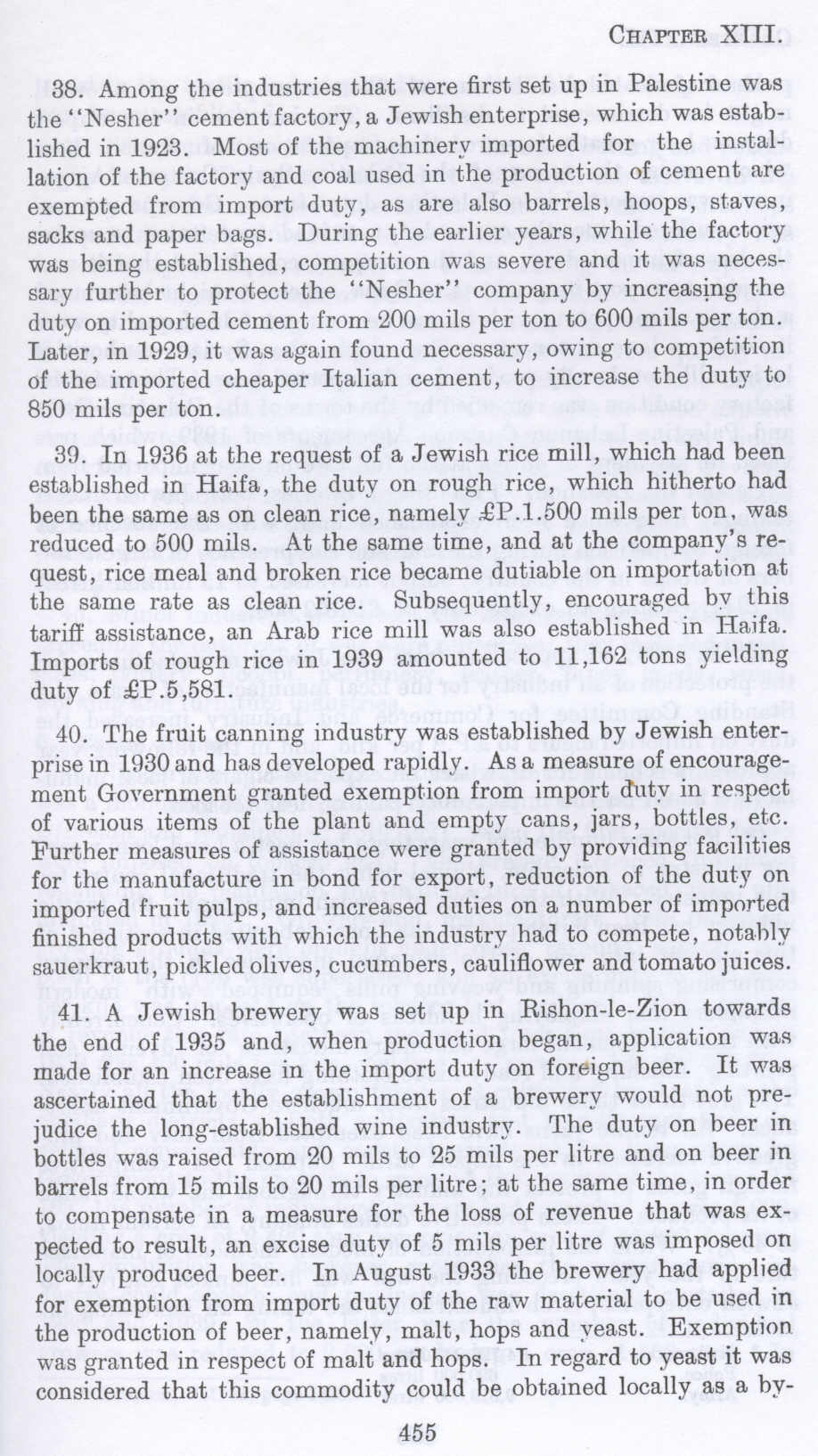| Prev | Next |  |
| Prev | Next |
| PalestineRemembered | About Us | Oral History | العربية | |
| Pictures | Zionist FAQs | Haavara | Maps | |
| Search |
| Camps |
| Districts |
| Acre |
| Baysan |
| Beersheba |
| Bethlehem |
| Gaza |
| Haifa |
| Hebron |
| Jaffa |
| Jericho |
| Jerusalem |
| Jinin |
| Nablus |
| Nazareth |
| Ramallah |
| al-Ramla |
| Safad |
| Tiberias |
| Tulkarm |
| Donate |
| Contact |
| Profile |
| Videos |
British Mandate: A Survey of Palestine: Volume I - Page 455 |
Disclaimer
The above documents, article, interviews, movies, podcasts, or stories reflects solely the research and opinions of its authors. PalestineRemembered.com makes its best effort to validate its contents.


Post Your Comment
*It should be NOTED that your email address won't be shared, and all communications between members will be routed via the website's mail server.
38. Among the industries that were first set up in Palestine was the "Nesher" cement factory, a Jewish enterprise, which was established in 1923. Most of the machinery imported for the installation of the factory and coal used in the production of cement are exempted from import duty, as are also barrels, hoops, staves, sacks and paper bags. During the earlier years, while the factory was being established, competition was severe and it was necessary further to protect the "Nesher" company by increasing the duty on imported cement from 200 mils per ton to 600 mils per ton. Later, in 1929, it was again found necessary, owing to competition of the imported cheaper Italian cement, to increase the duty to 850 mils per ton.
39. In 1936 at the request of a Jewish rice mill, which had been established in Haifa, the duty on rough rice, which hitherto had been the same as on clean rice, namely £P.1.500 mils per ton, was reduced to 500 mils. At the same time, and at the company's request, rice meal and broken rice became dutiable on importation at the same rate as clean rice. Subsequently, encouraged by this tariff assistance, an Arab rice mill was also established in Haifa. Imports of rough rice in 1939 amounted to 11,162 tons yielding duty of £P .5 ,581.
40. The fruit canning industry was established by Jewish enterprise in 1930 and has developed rapidly. As a measure of encouragement Government granted exemption from import duty in respect of various items of the plant and empty cans, jars, bottles, etc. Further measures of assistance were granted by providing facilities for the manufacture in bond for export, reduction of the duty on imported fruit pulps, and increased duties on a number of imported finished products with which the industry had to compete, notably sauerkraut, pickled olives, cucumbers, cauliflower and tomato juices.
41. A Jewish brewery was set up in Rishon-le-Zion towards the end of 1935 and, when production began, application was made for an increase in the import duty on foreign beer. It was ascertained that the establishment of a brewery would not prejudice the long-established wine industry. The duty on beer in bottles was raised from 20 mils to 25 mils per litre and on beer in barrels from 15 mils to 20 mils per litre; at the same time, in order to compensate in a measure for the loss of revenue that was expected to result, an excise duty of 5 mils per litre was imposed on locally produced beer. In August 1933 the brewery had applied for exemption from import duty of the raw material to be used in the production of beer, namely, malt, hops and yeast. Exemption was granted in respect of malt and hops. In regard to yeast it was considered that this commodity could be obtained locally as a by-
Page 455